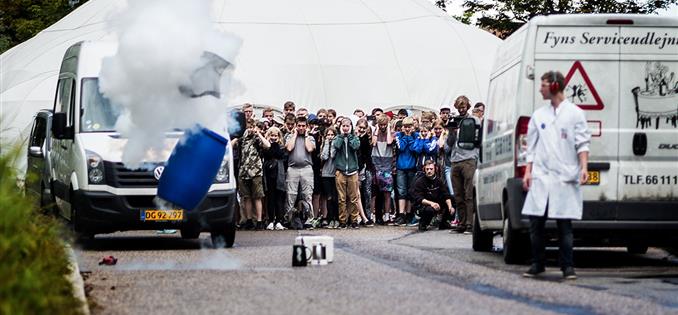YIPES, science is so exciting these days, what with those two black holes cuddling and giving all the physicists a thrill, and that Tim Peake fella posting pictures of your house from space. It’s a good thing then that in Manchester all the science is happening all the time. So much so that it’s even been officially designated the European City of Science for 2016. But how can you jump on this brand-new science trend? Manchester Confidential is here to explain a few things (not gravitational waves though, no one can explain them).
All those brain boxes getting together and throwing around ideas are bound to come up with something brilliant
What exactly is The European City of Science?
It’s a designation that means that in 2016 Manchester will be getting down with all things science. But funnily enough Manchester has been getting down with science for ages, like, since it was invented. As it happens, 2016 is the 250th anniversary of John Dalton’s birth. You know, the guy who basically invented atomic theory and modern chemistry. Then there was all that industrial stuff of course, then the transport revolution (the world’s first true canal and first passenger railway station were established in Manchester) while you wouldn’t even be reading this if Alan Turing hadn’t invented the world’s first stored programme computer at the University of Manchester. Then there was the splitting of the atom by Ernest Rutherford – the so-called ‘father of nuclear physics’, to today’s work on graphene by Nobel-prize winners Andre Geim and Konstantin Novoselov. It’s almost like they're putting all those years of science greatness in a centrifuge, whizzing it all around and giving us the best bits.
So, is it a bit like being a European Capital of Culture, but for science?
Kind of, except the Capital of Culture is decided by the EU. The City of Science is designated by something called EuroScience, which bills itself as ‘the non-profit grassroots association of researchers in Europe’. Unlike the Capital of Culture, it is designated every two years, instead of annually. Previous hosts have been Stockholm (2004), Munich (2006), Barcelona (2008), Turin (2010) Dublin (2012) and Copenhagen (2014). This is the first time there has been a UK capital.
 ECS 2014 - Copenhagen
ECS 2014 - CopenhagenAnd what’s the vibe going to be?
Last time around, the Danes had the friendly and oh-so-Scandinavian theme of ‘Building Bridges’ (bless). Manchester has gone for the altogether punchier-sounding ‘Science as Revolution’, aimed at encouraging debate and exploration of how science and technology transform our lives. The theme is a nod to Manchester’s proud scientific heritage and its reputation as a cradle of revolutions of all kinds – from the industrial to suffrage and computing to communism. After all, our city is where the modern world began.
When is it happening?
Actually it’s happening right now. The European City of Science was officially launched by the Manchester Science Festival 2015. Manchester will hold the title throughout this year until its close at the Manchester Science Festival 2016. Events will ramp up to a peak with the European Scientific Forum in July, when around 4,500 delegates will descend on the city. Stuff you can see right now includes The Imitation Game at the Manchester Art Gallery (see our preview here) or you can join in with the science blogging day at the University of Salford.
During the Forum itself there will be an opening ceremony and many different styles of presentation and discussion groups, from the highly technical to the more accessible. Non-delegates should look to Science in the City, an outreach programme that is being kept under wraps for now but promises to be 'a celebration of science that will bring the city alive with activities that inspire people to explore how science connects to their lives.' As events are confirmed they will be announced on the Manchester Science City website and we’ll be covering the very best here at Manchester Confidential. In the meantime, we’ll be exploring our scientific city in more depth over the coming months, looking into the science that’s being done under our noses right here.
Why is it important?
Firstly, it’s a great recognition of Manchester’s status as a scientific powerhouse. We can lay claim to 25 Nobel laureates (and counting). That’s more than most countries. Secondly, it will attract thousands of visitors and an estimated £9.6 million to the local economy. But the real benefits are of a less tangible nature. All those brain boxes getting together and throwing around ideas are bound to come up with something brilliant – imagine the cure for Zika virus or yet another wonder material born right here in Manchester. It’s also a chance for a dalliance with citizen science and schoolkids and students from the region to get inspired to study the STEM subjects – the future of our ability to feed, build, grow and cure ourselves is being generated right now. Who can think of anything more important than that?
Yes this is all very well, but what does Professor Brian Cox think about it all?















